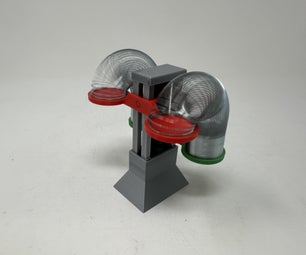Introduction: Zombie Apocalypse Defense - Movie Prop
PLEASE NOTE: This Instructable does NOT include any how-to instruction regarding metal saw blades or fire effects. It is a prop with motorized parts.
The cordless drill motor and chain drive system shown, include mechanical parts common in middle school FIRST Robotics Competitions starting at age 14+ (with adult supervision). I recommended sticking with that age range if you plan to build motorized mechanical things like this.
My personal finished version of this Zombie Defense Machine was used as a movie prop, therefore it utilized a couple of very realistic effects that were performed in a safe and controlled environment, NOT at a Halloween party.
I had a lot of fun designing and building this project. The theme and references are based on the video game Fallout 4. In the game, tools and weapons are constructed from repurposed fragments of found objects. I also learned several new skills and techniques that I will share with you in the following Instructable.
I would like this Instructable to inspire you to get creative and use your imagination to come up with your own crazy contraption. Use what you see here as a starting point to get your innovative thoughts moving! A geared-motor from an inexpensive cordless drill can can be incorporated in hundreds of ways. I do plan on future Instructables that will get into fine details on how-to repurpose these cheap power sources. So, stay tuned!
Supplies
Here are some of the supplies I purchased:
• Laser-cut steel - https://sendcutsend.com/
Note: Get 20% off with SendCutSend code: "SOLOSAVES20"
• FIRST Robotics components - https://www.vexrobotics.com/vexpro
• Drill motor - http://bit.ly/2pecoDm
• Hex Adapter - https://amzn.to/36YxTZF
• Spray Paint - https://amzn.to/2NCioPn
• Spray Clear - https://amzn.to/2X34uZM
• Masking Mustard - https://amzn.to/2qO87Xp
• Acrylic Paints - https://amzn.to/2rA4hlj
• Modeling Foam - https://amzn.to/2qGl9Gy
• Brass Pipe Parts - https://amzn.to/2Q8DKWp
Here are supplies I found:
• Empty Camp-stove Propane Bottle
• Discarded Propane Weed Torch w/Hose
• Discarded Propane Nozzle
• Old Saw Blades (for visual reference)
• Misc. Plumbing Parts
Camera and Video Gear:
• Main Camera - http://amzn.to/2iGbWqP
• Main Lens - http://amzn.to/2zbMboA
• Camera Frame - http://amzn.to/2zbMboA
• Secondary Camera - http://amzn.to/2zbMboA
• Tripod - http://amzn.to/2zbMboA
• Lighting Setup - http://amzn.to/2zbMboA
• Magic Arm A - http://amzn.to/2zbMboA
• Magic Arm B - http://amzn.to/2zbMboA
• Video Monitor - http://amzn.to/2zbMboA
• Mic - http://amzn.to/2zbMboA
Step 1: Collect Parts and References
Flea markets, Junk Dealers, Hardware Stores, and Scrap Yards are awesome places to get inspired and collect parts and materials for a project like this. The camp stove propane bottles are disposable and can be found in the trash at campgrounds. The one I found was already rusty!
Some of the plumbing was purchased new. The cordless drill is new from Harbor Freight ($14.99 w/coupon)
Step 2: Sorting Out the Plumbing Parts
I pretty much tore everything apart to see what could be salvaged and fit together for the look I was going for. The thin copper tubing was a left-over from a refrigerator installation!
Step 3: Sketches and CAD
Before I started the CAD drawings, I went through most of the parts and took some rough dimensions. That made things easier as I worked on the computer because I didn't need to stop and measure. My order of process was to position the components, then design the sheet metal frame to connect it all.
NOTE: I made my frame from sheet steel, but this could easily be cut out of thin plywood just as well. It sure would be a lot lighter! LOL!
Step 4: Forming a Foam Saw Blade
EVA foam is an all-time go to for prop making. Here I'm using 6mm thick foam to make the saw blades. I simply used a drafting compass to draw concentric circles, starting at the outside diameter of 10". I then loosely sketched the teeth curves. The X-Acto knife cuts are a little rough, but I think that jaggedness adds a nice effect.
Step 5: Painting and Weathering the Saw Blade
I used liquid acrylics in three colors, silver, brown, and black. By freehand dry-brushing in circular layers, I was able to get a scraped-rusty-metal look that was really close to the real saw blades I had as reference.
Step 6: Saw Drive Setup
My whole drive system is based on the FIRST Robotics components that use a 1/2" hex shaft for connecting moving parts. The foam saw blades will need some sort of support where the shaft goes through. This could be a 3D printed or laser-cut part that is attached to both sides of each foam blade.
Step 7: Drill Motor Prep
I will have a more in-depth Instructable in the future showing the details of using the Harbor Freight drill motors. The main thing needed is to remove the chuck and replace it with a 3/8-24 hex coupling. See the supply list.
I'm also in the development stage of creating a universal motor mount. I used a 3D printed prototype on this version.
Step 8: Forge Some Steel!
I enjoy practicing my blacksmith skills, so I decide that I would add two forged "tusks" onto the front of my machine. It makes it all that much scarier to the zombies! I basically just hammered the metal until it was close to the shape I needed.
Step 9: Time to Laser-Cut Some Steel
I converted my 3D CAD sheet metal parts into 2D vector outlines in preparation to be laser-cut. I uploaded the files to SendCutSend. In about a week I had the finished parts in hand. Some post laser work was needed on the sprockets and the parts that required bending. I also tapped a few holes for some 1/4-20 bolts.
Step 10: Wire Up the Electrical Stuff
I added a short connector wire through a small hole in the back of the battery. I needed that because I no longer had the luxury of the drill body connection. I used the original trigger speed control by designing a close fitting case for it and added a separate forward and reverse toggle switch. I do plan on making this trigger case and the motor mount available very soon. Please keep a lookout for those in the near future on my website.
Step 11: Always Need Some 3D Printing!
I made quite a few bushings and connection components to be 3D printed. I always seem to find a place for more digital fabrication!
Step 12: A Little Bit of Leather Craft
Yep! That is an old boot! I recycled some of this leather to make the double "D" ring straps to hold the battery and the propane tank in place. Just some simple saddle stitches! These straps are attached by slipping through a slot in the metal frame, then a small bamboo dowel is pushed into the loop. Seems to hold pretty good!
Step 13: Time for "Mustard Masking"
The Mustard Masking worked way better than I had ever imagined! I cleaned the steel, splattered the mustard, then let it dry.
Step 14: Dry the Mustard and Paint
I was so amazed! The steel started to rust, right on time. I then spray painted the "bull dozer yellow" right over it!
Step 15: Let's Make the Paint Peel
After drying for about an hour, I submerged the parts in water and lightly scrubbed them with a brush. Amazingly real chipped metal effect! With the BONUS of real rust! The sprockets were treated with a little vinegar, the heated with a torch to get the nice color effect.
Step 16: Build the Noise-Maker (anti-muffler)
My noise maker ended up sounding very much like a real chainsaw! The strip of spring steel simply clicks along on one of the open sprockets and makes a very loud racket! The holes are just for looks.
Step 17: Painting the Little Parts
The 3D printed parts get a coat of spray paint.
Step 18: Assembling the Main Frame Parts
I used a variety of bolt styles to make this thing look even more eclectic. The large hex bearings and axle shafts are yet another example of FIRST Robotics components.
Step 19: Installing the Electrical Parts
Mounting the electrical parts was pretty simple. most of the wiring is just hanging loose within the frame.
Step 20: Getting the Grunge on (weathering)
Weathering is such a fun part of the prop making process. I wanted this machine to not only look used, but beat up and grimy. Black and grey acrylic paints did most of the work. I just brushed it on and wiped it as it was drying. So simple, yet so effective.
Step 21: Plumbing the Machine
The plumbing parts added some of the finer details and color to this build. Probably my favorite elements.
Step 22: The Last of the Mechanical Parts
The some of the last things to go on were the chains and sprockets. Shaft collars hold the sprockets on the axles. Cinching up the leather straps was quite satisfying.
Step 23: Shots of the Finished Prop
Yes, I did stand and gaze at this beast for several minutes after it was all together. So many little details went into this. So seeing it together and complete was a great feeling of accomplishment. The total weight came in at 24 pounds!
Step 24: A Few More Beauty Pics!
I had a huge amount of fun building this crazy contraption. I may have missed a few details, so if you have any questions or comments please feel free to contact me through messages here or on any of my other social media.
Many of my plans, drawings, and 3D models are available for FREE download on my web site here: https://www.worksbysolo.com
I hope enjoyed this Instructable! Do you like my work?
You can also find me on other social platforms!
• My Website: https://www.worksbysolo.com
• Patreon: https://www.patreon.com/worksbysolo
• YouTube: https://www.youtube.com/worksbysolo
• Instagram: https://www.instagram.com/worksbysolo
• Twitter: https://twitter.com/WorksBySolo
We are a participant in the Amazon Services LLC Associates Program, an affiliate advertising program designed to provide a means for us to earn fees by linking to Amazon.com and affiliated sites.
Step 25: Now Go Watch the YouTube Video!

Second Prize in the
Halloween Contest 2019













